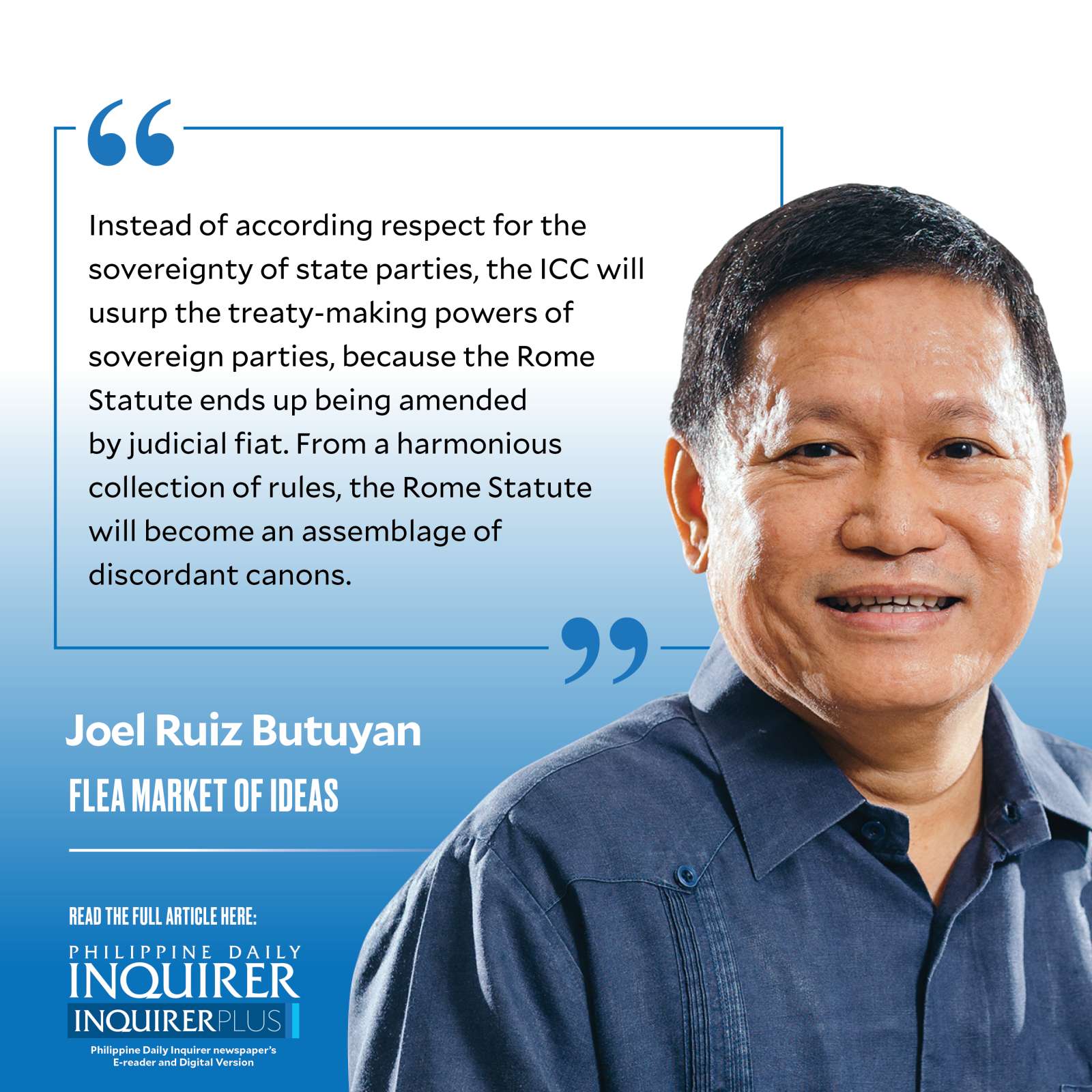The ICC’s continuing jurisdiction over PH (3)
We are in the midst of discussing an interpretation of Article 127 of the Rome Statute that will result in the dismissal of any International Criminal Court (ICC) case against former president Rodrigo Duterte, and others who share his fate. We previously cited two reasons why such an interpretation violates the Rome Statute, and we continue to discuss the other reasons below.
Third, the subject interpretation will cause havoc on the ICC’s foundational principles of complementarity and admissibility. Under the Rome Statute, state parties have the primary jurisdiction to investigate and prosecute ICC crimes. The ICC will step in with its complementary jurisdiction, only if a state party is either “unwilling or unable genuinely to carry out the investigation or prosecution.” A domestic investigation which turns out to be a sham because it’s being “undertaken to shield” a liable person, laden with “unjustified delay,” or not “conducted independently or impartially,” will make the case admissible within the jurisdiction of the ICC. But these factors of unwillingness, inability, or unjustified delay may only become clear and verified over an extended period of time, stretching more than one year after a state party’s withdrawal. If the subject interpretation is adopted, a horrific ICC crime which happens one month before a state party’s effective date of withdrawal, will require a finding that the domestic investigation that’s still being undertaken in its infancy, is a bogus investigation, for the ICC to retain extended jurisdiction. Worse, the subject interpretation will incentivize state parties to couple their withdrawal with a sham or delayed investigation in order to weaponize their withdrawal with retroactive effect.
Article continues after this advertisementFourth, there are contingent scenarios that are anticipated and addressed by provisions of the Rome Statute. However, these contingent events are transformed into unanticipated and unresolved contingencies if the interpretation in question prevails. These contingencies include the following: 12 months mandatory suspension of any Office of the Prosecutor probe caused by a United Nations Security Council resolution (Article 16); six months mandatory suspension of any OTP probe caused by the lack of a Security Council determination of the existence of the crime of aggression (Article 15 bis); death, resignation, or inhibition of the ICC prosecutor or a judge while an OTP examination is ongoing or a request for a PTC authorization is pending. The occurrence of these events between a country’s notice of withdrawal and the withdrawal’s effective date, one year after, will either shorten or totally cancel out the ICC’s extended jurisdiction during that one year window. The absence of Rome Statute provisions that address the effect of these contingent events shows that ICC state parties never intended to adopt the subject interpretation. For the ICC to provide rules for these contingencies through case decisions—on top of requiring an OTP request for investigation and PTC grant of such request—will amount to judicial treaty making.
Fifth, in recognizing a state’s right to withdraw from the ICC, Article 127 of the Rome Statute sets out only two very clear conditions of any withdrawal. First, “a withdrawal shall only take effect one year after … notification.” Second, notwithstanding its withdrawal, “(a) State shall not be discharged … from the obligations arising from [the Rome] Statute while it was a Party to the Statute.” The other provisions of Article 127 (second paragraph, second sentence) are imperfectly worded articulations meant only to explain and illustrate—but not limit—the ICC’s continuing jurisdiction over already pending investigations. To argue otherwise, as advocated by the subject interpretation, will result in nonsensically splitting the “obligations” of withdrawing states into two: 1) The accrued financial obligations of a sovereign state to the ICC which will remain as its perpetual liability beyond the years of its withdrawal from the ICC, and; 2) The liabilities for ICC crimes incurred by citizens of a withdrawing state which will be totally erased upon their country’s effective date of withdrawal, except those which are already the subject of pending ICC investigation.
The subject interpretation will result in an ICC abdication of a huge chunk of its entrusted powers. The ICC will bequeath those same powers to withdrawing states who will then be vested with immense authority to retroactively absolve their citizens of liability for ICC crimes. Instead of according respect for the sovereignty of state parties, the ICC will usurp the treaty-making powers of sovereign parties, because the Rome Statute ends up being amended by judicial fiat. From a harmonious collection of rules, the Rome Statute will become an assemblage of discordant canons.
Article continues after this advertisement—————-
Comments to fleamarketofideas@gmail.com

















